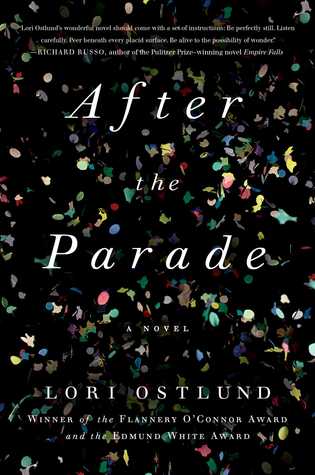Tags
language, literature, lori ostlund, parade, poetry, review, richard hugo, scribner, solitude

He saved me knowing that there is no stronger way to bind another human being to you than by saving him. This is why I must leave.
The day that Aaron Englund adds the 149th reason to his list of ‘grievances’ is the day (or rather night) that he’ll get into a car and drive off, without goodbyes. He’ll leave behind a life and his partner Walter, whom he’d been with for 20 years ever since Walter saved him, offering him a way out of his small Minnesota town, paid for his education and filled the void his absent parents left behind.
And so he packs up his belongings and drives to San Francisco, where he takes a job teaching English as a second language and finds a place to live in a tiny converted garage-apartment.
Going further into the book, more and more of the story belongs to Aaron the child and his memories of childhood with his abusive father and an increasingly withdrawn and depressed mother. Past and present coexist very closely in this book, and they unfold quite slowly with nuance, subtlety and an extraordinary talent for crafting secondary-characters. In fact: I can’t remember a single book I’ve read in recent years, where I’ve been so drawn to the stories of people appearing in a novel for only a short span of time, but for long enough to allow a glimpse into their story, into what makes them tic.
Maybe it is here where the writer of short stories shines through the most: the precision and generosity with which she will give just the right amount of space to a character to become fully fleshed out and not merely an anecdote.
You might come here Sunday on a whim.
Say your life broke down.
Poetry is omnipresent in Lori Ostlund’s first novel, and it is one more reason I so fell in love with this book. The lines above are from a Richard Hugo poem called ‘Degrees of Gray in Philipsburg’ and they keep re-appearing throughout the book like little landmarks.
Next to the underlying theme of leaving and arriving, of solitude and the desire to connect, it is language and the ability or disability to communicate that play a major role in ‘After the Parade’. There’s this wonderful anecdote, illustrating how just the lack of a small white space between two words can lead to major misunderstandings, when one of Aaron’s ESL students writes a love letter that reads “I want you near meat all times”.
It seems that Aaron’s love of language is only matched by his fear of it. The fear of getting it wrong. In a letter to Walter he explains his deep passion for foreign, obscure words entirely useless to him.
…it was only in tossing around those useless words – blurting them out to children on trains and to the spouses of your colleagues as we sat together at interminable dinners – that I truly felt I was communicating, letting everyone know how far I was (and would always be) from ever being able to say anything that I really meant or needed to say.
Highly recommended.
With many thanks to NetGalley and Scribner for the ARC.